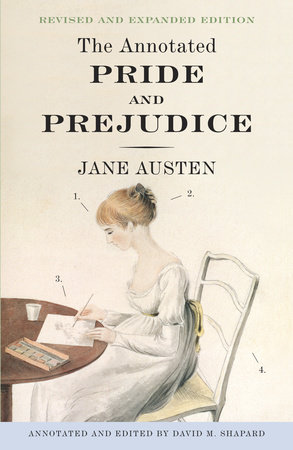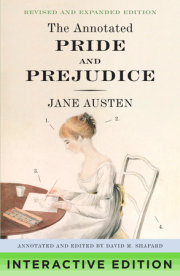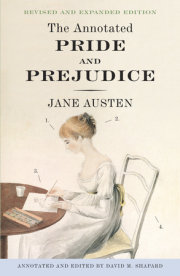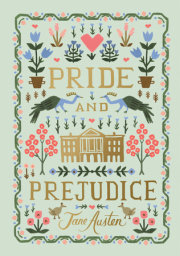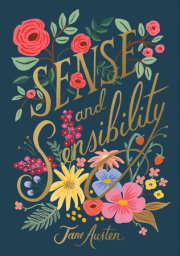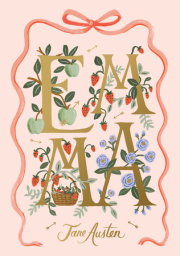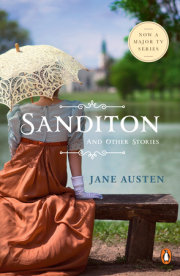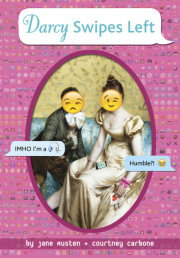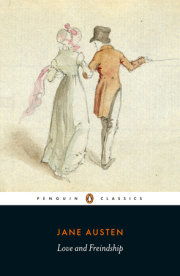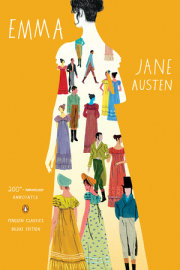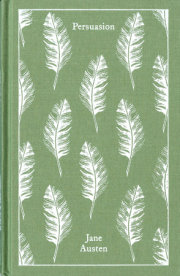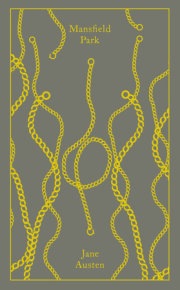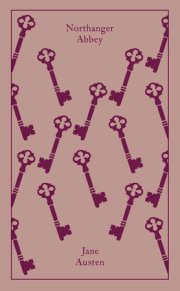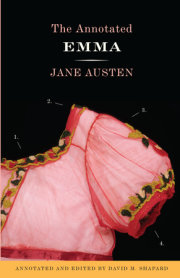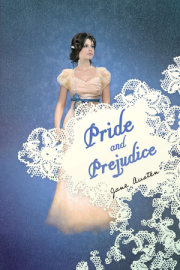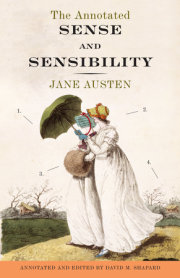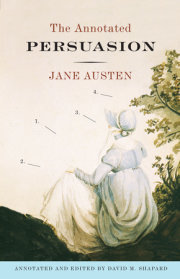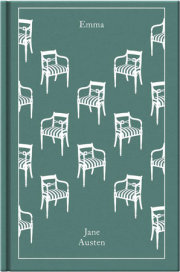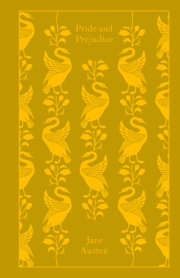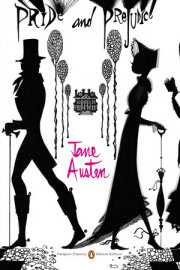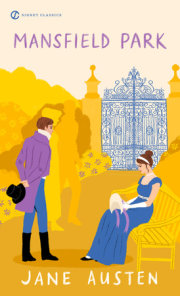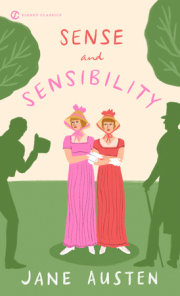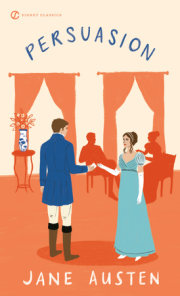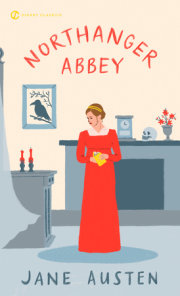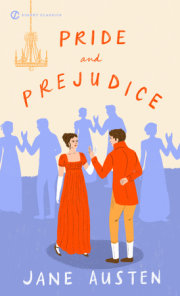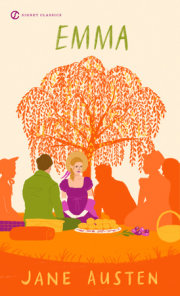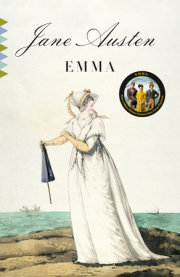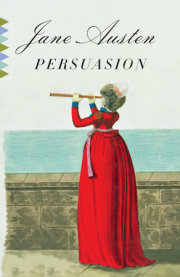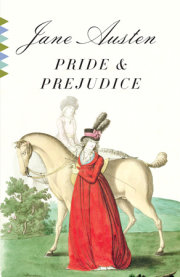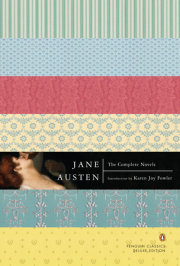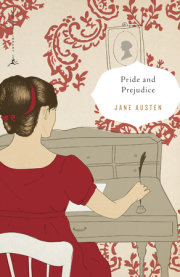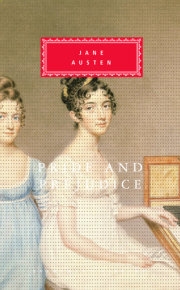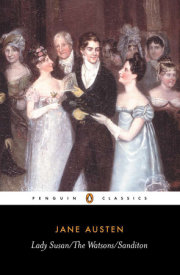(Note: In the printed book, annotations appear on facing pages; here in the excerpt they can be found as footnotes at the end of the excerpt.)
Volume One Chapter One It is a truth universally acknowledged, that a single man in possession of a good fortune, must be in want of a wife. (1)
However little known the feelings or views of such a man may be on his first entering a neighbourhood, this truth is so well fixed in the minds of the surrounding families, that he is considered as the rightful property of some one or other of their daughters.
"My dear Mr. Bennet," said his lady (2) to him one day, "have you heard that Netherfield Park is let at last?" (3)
Mr. Bennet replied that he had not. (4)
"But it is," returned she; "for Mrs. Long has just been here, and she told me all about it."
Mr. Bennet made no answer.
"Do not you want to know who has taken it?" cried his wife impatiently.
"You want to tell me, and I have no objection to hearing it."
This was invitation enough.
"Why, my dear, you must know, Mrs. Long says that Netherfield is taken by a young man of large fortune from the north of England; that he came down on Monday in a chaise and four (5) to see the place, and was so much delighted with it, that he agreed with Mr. Morris immediately; that he is to take possession before Michaelmas, (6) and some of his servants are to be in the house by the end of next week." (7)
"What is his name?"
"Bingley."
"Is he married or single?"
"Oh! single, my dear, to be sure! A single man of large fortune; four or five thousand a year. (8) What a fine thing for our girls!"
"How so? how can it affect them?"
"My dear Mr. Bennet," replied his wife, "how can you be so tiresome! You must know that I am thinking of his marrying one of them."
"Is that his design in settling here?"
"Design! nonsense, how can you talk so! But it is very likely that he may fall in love with one of them, and therefore you must visit him as soon as he comes."
"I see no occasion for that. You and the girls may go, or you may send them by themselves, which perhaps will be still better, for as you are as handsome as any of them, Mr. Bingley might like you the best of the party."
"My dear, you flatter me. I certainly have had my share of beauty, but I do not pretend to be any thing extraordinary now. When a woman has five grown up daughters, she ought to give over thinking of her own beauty."
"In such cases, a woman has not often much beauty to think_of."
"But, my dear, you must indeed go and see Mr. Bingley when he comes into the neighbourhood."
"It is more than I engage for, I assure you."
"But consider your daughters. Only think what an establishment (9) it would be for one of them. Sir William and Lady Lucas (10) are determined to go, merely on that account, for in general, you know, they visit no new comers. Indeed you must go, for it will be impossible for us to visit him if you do not." (11)
"You are over scrupulous, surely. I dare say Mr. Bingley will be very glad to see you; and I will send a few lines by you to assure him of my hearty consent to his marrying which ever he chuses of the girls; though I must throw in a good word for my little Lizzy."
"I desire you will do no such thing. Lizzy is not a bit better than the others; and I am sure she is not half so handsome as Jane, nor half so good humoured as Lydia. But you are always giving her the preference."
"They have none of them much to recommend them," replied he; "they are all silly and ignorant like other girls; but Lizzy has something more of quickness than her sisters." (12)
"Mr. Bennet, how can you abuse your own children in such a way? You take delight in vexing me. You have no compassion on my poor nerves." (13)
"You mistake me, my dear. I have a high respect for your nerves. They are my old friends. I have heard you mention them with consideration these twenty years at least."
"Ah! you do not know what I suffer."
"But I hope you will get over it, and live to see many young men of four thousand a year come into the neighbourhood."
"It will be no use to us, if twenty such should come since you will not visit them."
"Depend upon it, my dear, that when there are twenty, I will visit them all." (14)
Mr. Bennet was so odd a mixture of quick parts, (15) sarcastic humour, reserve, and caprice, that the experience of three and twenty years had been insufficient to make his wife understand his character.
Her mind (16) was less difficult to develope. (17) She was a woman of mean understanding, (18) little information, (19) and uncertain temper. (20) When she was discontented, she fancied herself nervous. (21) The business of her life was to get her daughters married; its solace was visiting and news. (22)
Annotations – Chapter 1 1. The famous opening line, with wonderful economy, accomplishes two main purposes. It indicates the novel's central subject of marriage, along with the financial considerations usually involved in it. It also sets the tone of irony that will pervade the book, for in fact, as we immediately see, it is the single women in this society who are truly in want, or need, of a man of large fortune. The term "acknowledged" adds to this effect, for it suggests the possibility that this supposed truth about single men may be more valid in people's beliefs than in reality.
2.
his lady: his wife.
3. Netherfield Park is the name for a home in the Bennets' neighborhood. It was common for houses, if grand enough, to be given a name, often with words such as park in them to indicate their attractive and rustic character.
It was not unusual for large houses to be rented out, for it cost a substantial amount of money to staff and maintain a grand home, and many landowners might find themselves unable to afford it. In Jane Austen's
Persuasion the heroine's family, thanks to the father's extravagant spending habits, is forced to let their house and move into apartments in the resort city of Bath.
4. Until its concluding paragraph, the entire rest of the chapter consists of dialogue between Mr. and Mrs. Bennet. Dialogue occupies much of Jane Austen's novels, and presentation of character through dialogue is one of her fortes as a novelist. In this case, Mrs. Bennet's excitable exclamations and exaggerated phrasing reveal her flightiness and impetuousness, while Mr. Bennet's terseness and irony reveal his cool detachment.
5.
chaise and four: chaise is a type of carriage; it seated three people, all facing forward, and was enclosed (see illustration on p. 397). Four refers to the number of horses pulling it. A chaise was a popular vehicle for long-distance travel, so it would be a logical one for someone coming from far away to use (in this case, as we find out later, it happens to be the carriage Mr. Bingley owns and uses regularly).
6.
Michaelmas: September 29. It was one of the four days used to divide the year into quarters; the other three were Christmas, Lady Day (March 25), and Midsummer Day (June 24). The action of the novel, which is carefully worked out chronologically, will terminate around Michaelmas of the following year; most of Jane Austen's novels transpire over an approximate period of one year.
7. It was common for servants to precede their masters in order to prepare a house for the latter's arrival.
8.
four or five thousand a year: his annual income in pounds. This is the way Jane Austen usually describes men's wealth; the income would normally come from the agricultural profits on land or from other property and invest-ments (in Bingley's case it turns out to be the latter). It is not easy to translate incomes of the time into today's money. By some calculations, the effects of inflation mean that a pound in Jane Austen's time has the same value as almost forty pounds today; if so, Bingley's income would be the equivalent of 150,000 to 200,000 a year in today's pounds (or around $250,000-$300,000 in current U.S. money). Altered economic condition, however, make estimates like this tricky: for example, goods tended to be much dearer at that time, in relative terms, while labor tended to be much cheaper. In addition, average incomes in this period, even when adjusted for inflation, were much lower than today, so Bingley's income represents a far sharper deviation from the prevailing norm than its current equivalent would be.
Another way to look at the issue is to note that in
Sense and Sensibility a mother is able to support herself and three daughters in reasonable comfort in a nice home she has rented, and with a staff of three servants, on five hundred a year. Jane Austen herself lived most of her life on less than that. The Bennets themselves have an income of 2,000 a year (to which should be added a house and its contents). Hence Bingley, however one calculates it, is a truly rich man, which is why he is such a desirable matrimonial prospect.
Mrs. Bennet's statement about Bingley's income, uttered before he has even arrived, reveals the speed with which vital information about people could circulate. The principal means for this is local gossip, which plays a central role in this society. The gossip would be greatly assisted by the many servants in employment, for the servants in one household could tell its secrets to servants in other households, who could in turn tell their employers. This process is mentioned later in this novel, as it is in other Jane Austen novels, most notably in
Emma.
9.
establishment: marriage.
10.
Sir William and Lady Lucas: William Lucas, as is shortly revealed, was knighted. This means that he is now called Sir William Lucas, or just Sir William, and his wife is Lady Lucas.
11. In this society there are strict rules for visiting people one does not know. In the case being discussed here, since Mr. Bingley is a man, Mr. Bennet should make the acquaintance first (Mrs. Bennet worries about both Sir William and Lady Lucas visiting, but in fact only Sir William goes--see p. 14). Mr. Bennet certainly knows this, and is simply pretending not to know in order to tease his wife. His teasing goes still further in his earlier suggestion that the daughters go without even their mother, for young unmarried women would never visit an unmarried and unrelated young man on their own, even in cases, unlike the present one, where they were already acquainted with him.
12. Lizzy's being the first to be mentioned, as well as her being the first to speak in the next chapter, indicates her prominence in the story. This exchange also gives a hint of her affinity with her father, and of the quickness, or mental sharpness, that is one of her defining features.
13. During the century preceding this novel, nerves had become one of the dominant ways of explaining bodily processes (they often replaced earlier theories revolving around "humours"). A whole variety of diseases or ail-ments were commonly ascribed to nervous disorders or to nervousness; one medical writer of the time, Thomas Trotter, declared that "nervous diseases make up two-thirds of the whole with which civilized society is infested." Nerves also had the advantage for hypochondriacs of being intangible and invisible, which meant that their aggravation or distress could not be easily disputed. This made poor nerves a popular self-diagnosis for those such as Mrs. Bennet who liked to complain about their health.
14. The indifference Mr. Bennet professes throughout this scene toward his daughters' marital prospects is meant humorously, but it also suggests what will become more apparent later, that he, while possessing many good qualities, is irresponsible as a father. Mrs. Bennet's obsessive husband-hunting clearly goes too far, but it has a basis in the dire economic consequences suffered by young women in this society who fail to find husbands. Since, as is revealed later, the Bennet girls' financial situation is particularly desperate, their need for husbands is even more acute.
15.
parts: qualities or attributes.
16.
mind: mental and emotional character. The word had a less purely intellectual connotation then than it does now.
17.
develope: discover, understand.
18.
mean understanding: inferior intelligence or judgment.
19.
information: education or knowledge.
20.
uncertain temper: unsteady or capricious temperament.
21.
nervous: suffering from nervous disorders.
22.
news: news or gossip about the neighborhood (not news of national affairs).
Copyright © 2004 by David M. Shapard. All rights reserved. No part of this excerpt may be reproduced or reprinted without permission in writing from the publisher.

